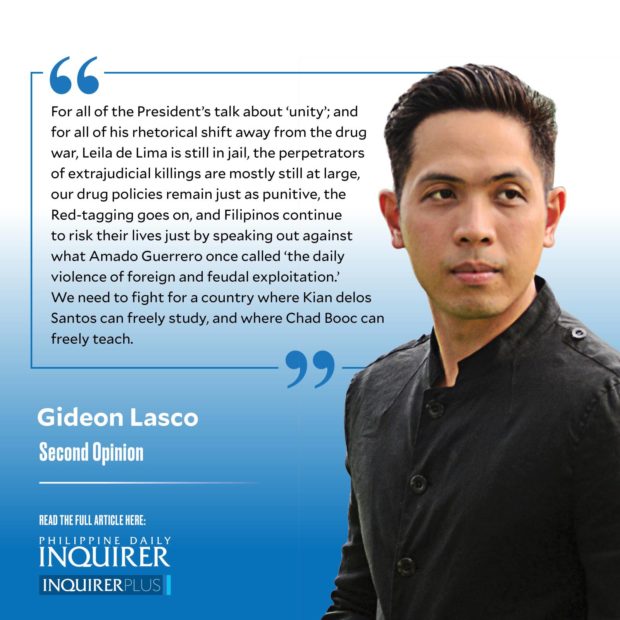At the start of a new year, my simple request to the government is to redouble its efforts to provide the basics to the people.
Such, likewise, is my call to action and (self-)reflection.
Perhaps, in the aftermath of the horrendous Ninoy Aquino International Airport (Naia) fiasco, having decent airports comes to mind. After all, with a large diaspora and significant OFW population, the need for air travel transcends class in the country, from our President who has averaged one foreign trip a month, to the domestic helper in Hong Kong who lamented that, because of the Naia nightmare, her job is “now in limbo.”
Alas, our country is wanting in ways that are far more fundamental than air travel.
For instance, sanitation. It is very sobering to be reminded that many Filipinos—by some estimates around 10 million—don’t have basic toilets in their homes. Some regions have it even worse: In Eastern Visayas, for instance, a quarter of households don’t have toilets. Beyond the indignity and inconvenience, this lack of sanitation is precipitating health problems. For instance, over a century since cholera outbreaks were virtually eliminated in Europe and North America, our country continues to grapple with this bacterial infection, which caused over 6,000 cases and claimed at least 74 lives in 2022. Basic sanitation could have prevented these cases and deaths altogether.
Education, of course, is also essential, most especially the most rudimentary skills of reading and writing. It is thus very distressing—may we never be desensitized to its unacceptability—to hear reports, like most recently that as per an Inquirer report, “at least 75 percent of Grade 3 students in Central Visayas still do not know how to read or have low reading comprehension.” Sadly, Vice President Sara Duterte seems to be fostering what my colleague Antonio Montalvan II calls “culture of submission”—through ROTC and activities like toothbrush drills—instead of promoting basic education skills and the critical thinking that can only come with a recognition that extracurricular activities are as important as classroom learning.
Then there is health care. When my grandmother had a minor fracture over the holidays, the bill that ran to several tens of thousands of pesos reminded me of how, even with PhilHealth, health care in the country is prohibitively expensive, with little or no regulation or accountability as to how fees are set. It is clear to me the private sector, with its profit motive, cannot be the sole vehicle for universal health care, and the Department of Health must redouble its efforts to build a publicly funded, affordable, and accessible quality health infrastructure.
Nutrition, too, is basic. Quite remarkably, the most recent Food and Nutrition Research Institute report showed that stunting has actually significantly decreased from 40 percent to 26.7 percent, but it is still a significant burden—one that today’s inflation can exacerbate. And of course, Filipinos deserve more than survival; we deserve not just sustansiya, but sarap. Thus, onions are basic. Chili peppers are basic. Rice is basic—even if root crops are also great (nutritionally and economically) and must be promoted too.
I can go on and talk about agriculture, about inclusive mobility, about quality public transport, and the many other basics that our politicians would rather ignore while pushing for dubious initiatives like the Maharlika Investment Fund. Fortunately, there are many good people in government whose aspirations are aligned with ours, and who would be empowered to push for reforms from within if we are to also push for it from without. But this is not always easy, because many have been killed, jailed, or harassed in this country simply for fighting for the basics, from Alberto Ramento to Zara Alvarez.
This brings me to a precondition to the basics that is just as fundamental as the water we drink and the air we breathe: human rights. The right to land. The right to earn a living, whether from fishing in the West Philippine Sea or farming in one’s ancestral domain. The right to choose one’s identity. The right to demand and obtain justice without the fear of getting harassed, arbitrarily arrested, jailed, or killed.
For all of the President’s talk about “unity”; and for all of his rhetorical shift away from the drug war, Leila de Lima is still in jail, the perpetrators of extrajudicial killings are mostly still at large, our drug policies remain just as punitive, the Red-tagging goes on, and Filipinos continue to risk their lives just by speaking out against what Amado Guerrero once called “the daily violence of foreign and feudal exploitation.”
We need to fight for a country where Kian delos Santos can freely study, and where Chad Booc can freely teach.
—————-
glasco@inquirer.com.ph


